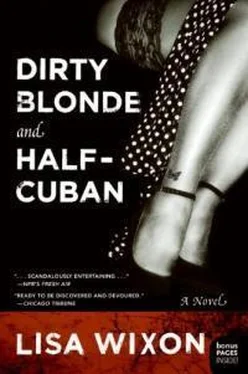Lisa Wixon - Dirty Blonde and Half-Cuban
Здесь есть возможность читать онлайн «Lisa Wixon - Dirty Blonde and Half-Cuban» весь текст электронной книги совершенно бесплатно (целиком полную версию без сокращений). В некоторых случаях можно слушать аудио, скачать через торрент в формате fb2 и присутствует краткое содержание. Жанр: Современная проза, на английском языке. Описание произведения, (предисловие) а так же отзывы посетителей доступны на портале библиотеки ЛибКат.
- Название:Dirty Blonde and Half-Cuban
- Автор:
- Жанр:
- Год:неизвестен
- ISBN:нет данных
- Рейтинг книги:4 / 5. Голосов: 1
-
Избранное:Добавить в избранное
- Отзывы:
-
Ваша оценка:
- 80
- 1
- 2
- 3
- 4
- 5
Dirty Blonde and Half-Cuban: краткое содержание, описание и аннотация
Предлагаем к чтению аннотацию, описание, краткое содержание или предисловие (зависит от того, что написал сам автор книги «Dirty Blonde and Half-Cuban»). Если вы не нашли необходимую информацию о книге — напишите в комментариях, мы постараемся отыскать её.
Dirty Blonde and Half-Cuban — читать онлайн бесплатно полную книгу (весь текст) целиком
Ниже представлен текст книги, разбитый по страницам. Система сохранения места последней прочитанной страницы, позволяет с удобством читать онлайн бесплатно книгу «Dirty Blonde and Half-Cuban», без необходимости каждый раз заново искать на чём Вы остановились. Поставьте закладку, и сможете в любой момент перейти на страницу, на которой закончили чтение.
Интервал:
Закладка:
“What is this?” I demand.
She points to the moving staircase. “What is that?”
I sigh, and my patience returns. The nation’s only escalators are inside the airport, and few Cubans have experienced the automated staircase. Daya is trying to be game, but she’s too young and too unsophisticated for her assignment as Richard’s love interest, even if it means her family can have a nice round of pork for many dinners to come. I clean her up and explain in detail the mechanisms of an escalator, and when we land on the second floor, I see a heap of tourists clearing customs and leaving for home, and it’s all I can do to keep from bursting into tears.
27
S choolchildren in crispwhite tops and mustard bottoms line up along the Malecón with flowers in their arms. When teachers give a signal, they flood the ocean with freshly cut oleander and bougainvillea.
It’s Camilo Cienfuegos Day, and habaneros pay annual tribute to a popular revolutionary, a non-Communist, who died under suspicious circumstances in a Cessna that disappeared over the sea some forty years before.
Victor stands across the street, his arms loaded with fragrant flora. The hardliner revolutionary dumps them unceremoniously and signals for me to keep walking. I make my way slightly uphill, without looking back.
The sidewalk is covered with turtle shells, their bodies bleating for mercy in hot pans. Victor is twenty paces behind. We have to be discreet, and I’m praying he has information on my father. I step into an empty bodega.
A rusty scale sits on the counter, and a sign over the barren shelves reads: Socialismo o muerte.Socialism or death. With this bounty, the latter seems most likely.
“Are there any eggs?” I ask the shopkeeper.
“There won’t be any eggs this week,” answers Victor, sidling next to me. “The chickens aren’t getting enough food, and so they’re not producing.”
The shopkeeper agrees with Victor and goes back to reading his newspaper.
“How much more food does the chicken need?” I ask. We are playing a charada,the kind of double-talk common in a land where what one says can land them in agua caliente.
Victor scratches his chin. “The chicken needs about a week’s worth of food. Then there will be eggs.”
The shopkeeper shoots us a strange glance.
“The chicken should know that it needs to produce,” I say. “That people are counting on those eggs.”
“The chicken knows, compañera.”
“Would the chicken be satisfied with a few scraps?”
“The chicken would prefer seed.”
“Coño,”says the clerk, gesturing that he’s trying to read. “Eggs next week.”
“The chicken is worried,” says Victor, “that the seed is inventandoin the night, and the ill-begotten seed shall cause problems to the digestive tract of the chicken.” I’m pretending not to be mortified that Victor knows of my new occupation, but my face turns crimson nonetheless.
“The chicken should not worry,” I say, smiling at the confounded shopkeeper while discreetly slipping Victor a hundred bucks, “where the seed comes from.”
“Perhaps,” says Victor, fingering the bill. “But what incentive does the chicken have to produce on tainted seed? It could infect him. Make him ill.”
Rolling my eyes, I hand him another hundred. “Those taking the seed in the night won’t get caught.”
“The chicken,” says Victor, “is not so sure.”
28
T oilet paper hasdisappeared from the markets. It’s been weeks now. Those fortunate enough to stockpile the dollars-only luxury (made of recycled sugarcane and wood pulp, so it feels like sand) hoard theirs as if it’s Lalique glass.
My landlord is blasé about the crisis and hands me a newspaper. It isn’t for reading. This evening, I decide, I’m not going to be Cuban. I grab my passport from the closet and make for the nearest hotel bathroom.
I nearly trip over a figure at my doorstep. In the darkness, I’m confused, though hoping it’s Limón with information on my childhood home.
But it’s Richard who’s waiting. He’s frantic. Daya, he says, inexplicably dumped a Cuba libre over his naked body and took off without enough money for a taxi home. After my pit stop, a car drops us near Richard’s rented apartment on the fringes of the old city. It’s pitch-dark. On the west side of Parque Central, two sidewalk bars are alight, and Richard and I agree to scout separately and meet there in an hour.
On intuition, I wait until Richard disappears before heading directly to the bar, arguably the wildest joint in all of Havana. Musicians play bongos and maracas, keeping infectious time with the dazzle of their feet. Police fortify the saloon, awaiting bribes from the low-rent prostitutes and hustlers and camajanesinside. I scan the room. It’s filled with a farrago of creepy multinationals; the dregs of the world’s sex tourists. The lumpen sort who could never get a decent date back home. Drunk and groping—with bored lingerie model–type cubanasat their sides, many of them barely in their teens—the men grab at female body parts as if they’re souvenir-shop gimcrack.
“Gluttons,” I mutter under my breath. The girls wear tight jeans and Lycra tops, their mouths lined in black and their faces blank. I wish I had enough money to pay every girl notto go home with the barbarians.
I think of the island’s beloved orange-red flowers known as Cupid’s tears. The bouquets bloom upright and are immediately swarmed by birds and insects who would steal their nectar. It’s a short-lived frenzy: the flowers, once depleted, droop downward, and wither to the ground.
In the corner, my own Cupid’s tear is sucking her thumb, sitting on the lap of a three-hundred-pounder. Daya leaps up and clutches me as if I’m her mother. I grab her by the arm and push our way through the crowd.
His voice is deep and honeyed, and I instantly recognize its owner as being out of place among the oddly shaped and intoxicated foreigners. Rafael is flanked by two German tourists, sunglasses masking their eyes and preteens gracing their arms.
Rafael thinks a moment before speaking. “I leave three, four messages for you, and nothing.”
I put a hand on my hip.
Rafael continues. “What, the Cuban phone system is too difficult for you to figure out?”
“Yeah,” I say, smirking. “All those buttons.”
Rafael leans near my ear. “Maybe I’ll come over and teach you how to push them.”
My face starts to burn, and I wheedle Daya out of the bar.
“I know where you live,” he threatens playfully, shouting over the top of the crowd. He doesn’t see my smile.
As we leave, a policeman follows, hollering at Daya for his mordida.I throw a clutter of dead presidents in the ditch and it quells him.
I can barely pull myself together to scold her. I clear my throat and manage to look stern. “What the hell, Dayanara? You have a very nice and very rich boyfriend. One you are going to lose if you keep this up.”
She pulls her thumb from her mouth long enough to tell me about their fight, that she needed money to get home and had been promised $20 for a few hours with the jiggle-bellied beast.
“Daya,” I say. “Do you want to be with Richard?”
A shrug.
“It’s your mother, isn’t it…You don’t have to do this, tú sabes?”
“Like you know,” she says accusingly. “Extranjera.”Foreigner. I sigh. No matter how Cuban I’ve become, no matter how much I share the struggle with my kinfolk, I’m rarely granted the permission to sympathize.
“There may be a crackdown coming, Dayanara,” I say sternly. “When it does, those cops won’t just take a few bucks, they’ll take you to jail. You hang out in a place like this and you are so busted. Coño.”
Читать дальшеИнтервал:
Закладка:
Похожие книги на «Dirty Blonde and Half-Cuban»
Представляем Вашему вниманию похожие книги на «Dirty Blonde and Half-Cuban» списком для выбора. Мы отобрали схожую по названию и смыслу литературу в надежде предоставить читателям больше вариантов отыскать новые, интересные, ещё непрочитанные произведения.
Обсуждение, отзывы о книге «Dirty Blonde and Half-Cuban» и просто собственные мнения читателей. Оставьте ваши комментарии, напишите, что Вы думаете о произведении, его смысле или главных героях. Укажите что конкретно понравилось, а что нет, и почему Вы так считаете.












